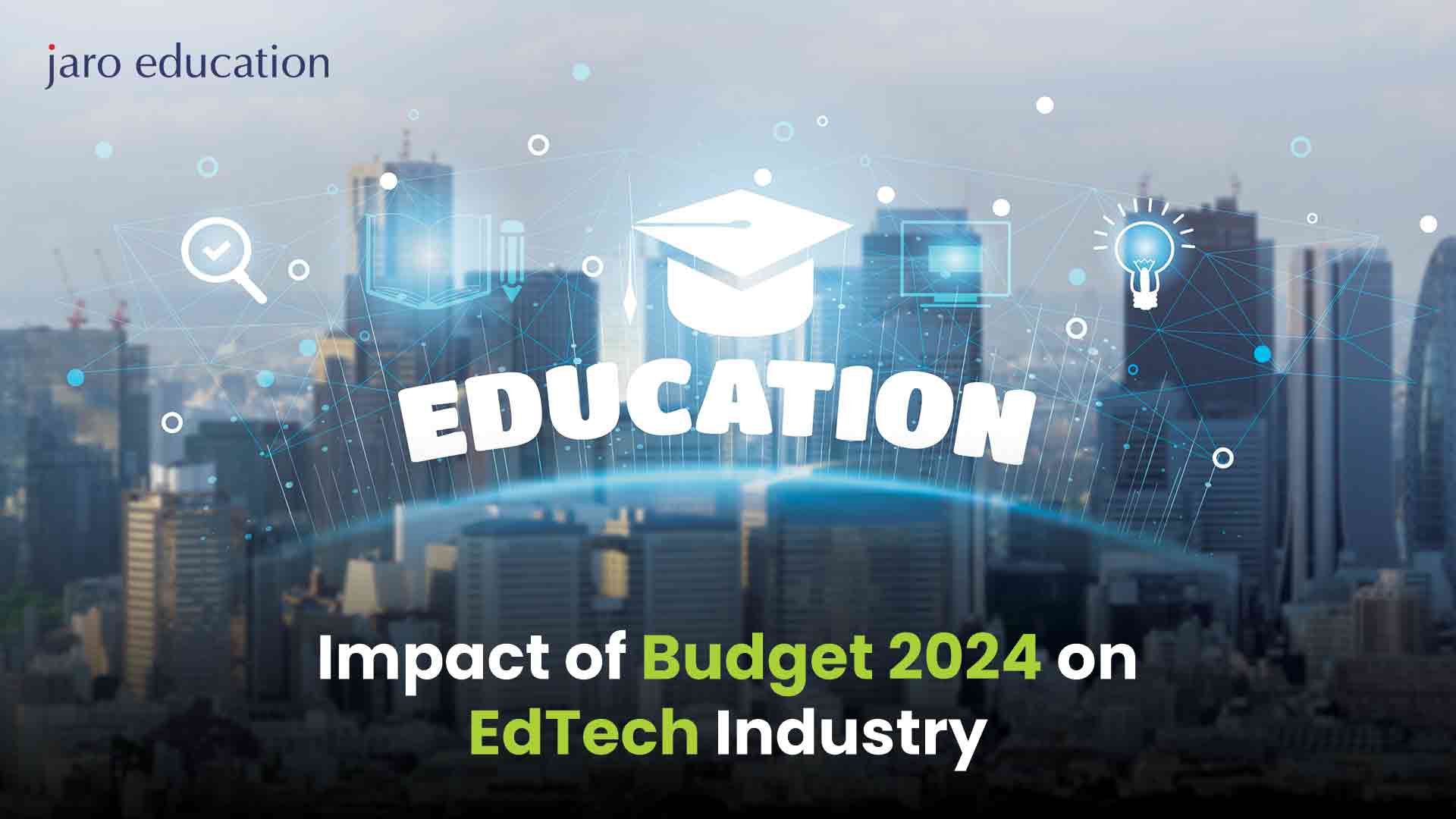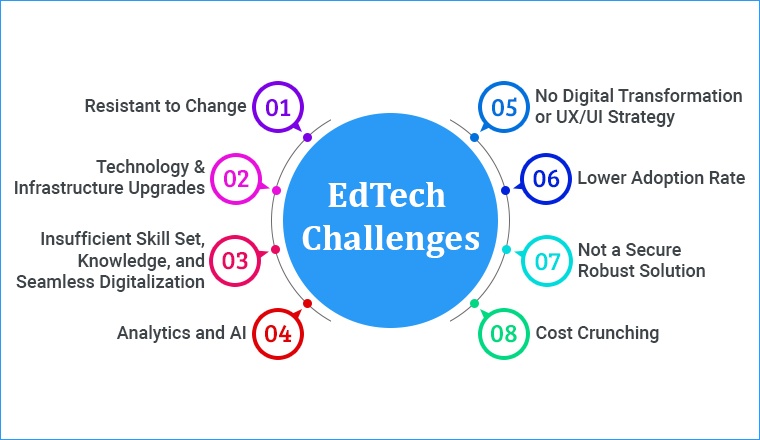Impact of Budget 2024 on EdTech Industry
Table of Contents

- jaro education
- 12, March 2024
- 10:00 am
The Union Budget for the financial year 2024-25 holds significant promise for India’s education sector, particularly for the burgeoning EdTech industry. As the nation grapples with accommodating a steadily increasing student population amid evolving educational paradigms, expectations are high for the budget to catalyze transformative changes. Anticipated allocations and policy shifts are poised to reshape the education landscape, enhancing access, quality, and relevance. Here, we will look into the anticipated impact of Budget 2024 on the concept of educational technology and its implications for the future of learning in India.
Changes in the EdTech Industry after Budget 2024
The 2024 budget established several changes in the field of EdTech. The things that are discussed in Budget 2024 for the EdTech industry in India are discussed below.
1. Digital Education and NEP 2020 Alignment
The EdTech industry, projected to reach USD 4 billion by 2025, stands at the forefront of educational innovation. With the National Education Policy (NEP) 2020 advocating for digital integration in learning, Budget 2024 is expected to prioritize initiatives aligned with this vision. Digital education has already demonstrated its potential to democratize access to quality learning, particularly in tier 2 and tier 3 regions, overcoming geographical barriers and fostering inclusivity. Investments in different types of educational technology and content creation, coupled with tax incentives for EdTech firms, are anticipated to catalyze the sector’s growth, driving forward the objectives of NEP 2020.
2. Greater Public Education Investment and Changes in Education GST
One of the critical expectations from Budget 2024 is an increase in the public education budget, aligning with recommendations from the Education Commission and NEP 2020. A significant hike in allocation from the GDP towards education is imperative to address the widening gap between educational needs and available resources. Furthermore, reducing GST on educational services, especially digital learning materials, is crucial for enhancing affordability and accessibility. Lowering the current tax slab from 18% would support EdTech firms and alleviate financial burdens on students, facilitating a more conducive learning environment.
3. Digitalization
The digitization of education, propelled by Budget 2024’s strategic allocations, holds immense potential for improving tertiary-level enrolment and enhancing the quality of education. The establishment of Digital Universities, offering vernacular education and ICT-enabled formats, promises to extend the reach of personalized learning across the nation. By embracing technology, India’s educational landscape is undergoing a paradigm shift, transitioning from rote learning to dynamic, skill-centered approaches. EdTech initiatives have been instrumental in bridging educational disparities and making quality education more accessible and affordable, particularly in underserved regions.

*tatvasoft.com
4. Internationalisation of Higher Education
Budget 2024 is expected to promote the internationalization of Indian higher education, in line with NEP 2020’s vision of positioning India as a global study destination. Collaborations with prestigious foreign universities and the establishment of online and hybrid degree programs are anticipated. Recent regulatory measures allowing international institutions to open campuses in India signify a step towards realizing this objective. By facilitating cross-border partnerships and promoting research and development, Budget 2024 aims to elevate India’s stature as a center of excellence in international education.
5. Schemes to Encourage Tertiary Education and Skill Development
Post-secondary education and vocational training are areas of focus for Budget 2024, aimed at bridging the gap between enrollment at primary and tertiary levels. Affordable student loans, government subsidies, and scholarships are expected to incentivize higher education participation, particularly among students from low-income backgrounds. Additionally, emphasis on vocational education at the secondary level, as outlined in NEP 2020, underscores the importance of skilling India’s workforce for the future. Budget allocations towards teacher training and curriculum development in vocational streams are pivotal for nurturing a skilled workforce aligned with industry requirements.
Conclusion
Budget 2024 holds immense promise for the future of EdTech in India to revolutionize the country’s educational landscape. By prioritizing digital integration, increasing public education investment, fostering international collaborations, and promoting skill development, the budget sets the stage for a more inclusive, accessible, and future-ready education system.
Amidst this financial upgrade, staying ahead with a deep understanding of new-age financial concepts, analytics, and strategies is essential for professionals. Recognizing this need, IIM Mumbai has meticulously crafted an Executive Certificate Programme in Corporate & Strategic Finance for seasoned finance professionals and aspiring financial leaders. This course is strategically designed to equip participants with a profound understanding of key financial concepts and strategies, including fundamental financial statements and fintech innovations.
With a focus on experiential learning, the course offers case studies, interactive sessions, and more.
Frequently Asked Questions
Cybercriminals are continuously improving their attacking abilities with the help of AI. Now they are launching large-scale attacks by integrating AI technologies into their workflows. To prevent these attacks, you should utilise AI to analyse large volumes of data, reducing false positives from security alerts and cutting out bottlenecks from security alerts.
The major benefits of AI-based cybersecurity include –
- Quickly analysing large volumes of data
- Automating the repetitive cybersecurity tasks
- Predicting potential attacks and providing messages to the security teams
To become a professional in AI cybersecurity, you need knowledge about ML data modelling, language modelling, behaviour analysis, and deep neural networks. For cybersecurity, you need a clear understanding of network security, cryptography, malware detection, data protection, and computer forensics.
No, AI can perform specific tasks in cybersecurity, but it can’t completely replace human input.
Yes, the cybersecurity professionals can automate the mundane tasks with the help of AI.
| Basis | Perfect Competition | Monopoly |
|---|---|---|
| Number of Sellers | firms | Single firm |
| Barriers to Entry | Very low | Very high |
| Substitute Products | Good substitutes are readily available | No good substitutes are available |
| Competitive Strategy | Firms compete through prices only | Companies compete through product features, quality, advertising, and marketing |
| Pricing Power | Negligible, dependent on supply and demand | Significant, companies can manipulate prices as desired |
Programme on Strategic Management
Programme on Strategic Management
Programme on Strategic Management
Programme on Strategic Management
Programme on Strategic Management
Programme on Strategic Management
Programme on Strategic Management







